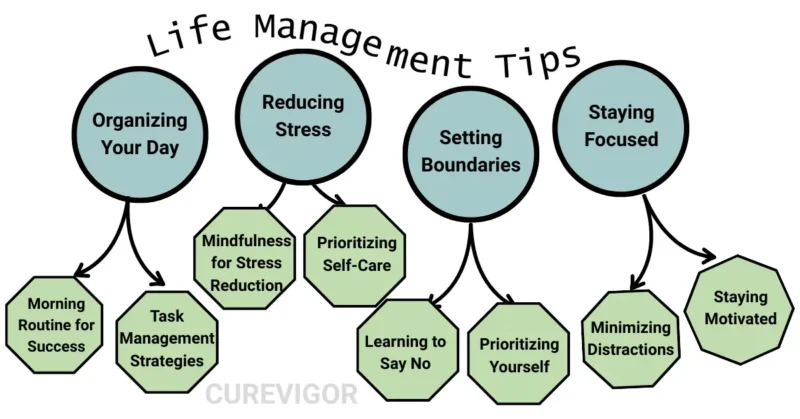Learn how to apply simple yet powerful life management tips to boost productivity, reduce stress, and create balance in your daily routine.
Thank you for reading this post, don't forget to subscribe!By implementing prioritization techniques and setting boundaries for her tasks, she was able to conserve her energy and enhance her focus.
How to Master Life Management Tips for Stress-Free Productivity and Balance
Life today feels faster than ever. Endless to-do lists, constant notifications, and pressure often leave us drained. Life management tips offer practical ways to structure your day, improve focus, and lower stress.
By using effective life management strategies, you can create a daily routine that supports productivity and peace of mind. One such example is Sarah, a project manager who juggled multiple responsibilities and often felt overwhelmed.
All this not only helped her achieve her professional goals but also allowed her to allocate time for personal growth and relaxation. Key takeaways from her experience include forming habits to achieve goals, conserving energy, and maintaining balance in daily life.
Understanding Life Management Before Setting Life Management Tips

Life management is essential for a balanced, productive life. It unites smart time and stress management, helping you focus on what matters without feeling overworked. Let’s examine each subject.
A. Time Management
1. Prioritizing Tasks
One key life management tip is learning to prioritize. Many fall into the trap of being “busy” but not productive. The difference is focusing on high-value tasks that move your life or career forward.
A great starting point is the Eisenhower Matrix, which divides tasks into four categories: urgent and important, important but not urgent, urgent but not important, and neither urgent nor important.
This method helps you identify what deserves immediate attention, what can be scheduled for later, and what can be delegated or eliminated altogether. For everyday use, a simpler method like the ABC prioritization system works well. Mark your tasks as A (critical), B (important but not urgent), or C (optional).
Begin your day with “A” tasks, ensuring your most impactful goals are handled first. This system prevents procrastination and helps you feel accomplished at the end of the day.
Pro tip: Pair prioritization with goal setting. When your daily tasks align with long-term goals, your efforts compound into lasting success.
2. Scheduling Wisely
Another essential organizational strategy is smart scheduling. A schedule doesn’t need to look rigid or exhausting — it should provide structure and clarity. A good schedule reduces decision fatigue, which is a common cause of stress and procrastination.
Break big projects into smaller, actionable steps. Instead of “Finish presentation,” create smaller tasks: “Outline slides,” “Design visuals,” “Practice delivery.” Smaller steps feel less overwhelming and help you finish.
Set realistic goals: Overloading your day with 20 tasks causes burnout. Instead, focus on 3–5 major goals you can complete. Leave buffer time between meetings or tasks for interruptions. This flexibility makes your day manageable and reduces stress when things change.
For those with unpredictable routines, adapt by identifying a few priorities that need completion but be ready to shift tasks around as necessary. This approach helps maintain productivity even when your day doesn’t go as planned.
Pro tip: Try time-blocking. Dedicate chunks of your day to similar activities (emails, creative work, calls). This keeps you focused and prevents constant task-switching, which drains energy.
B. Stress Management
1. Identifying Stressors
You cannot manage what you cannot see. A powerful way to build resilience is to identify your personal stressors. These can include overcommitment, lack of boundaries, poor sleep, financial pressure, or even digital overload.
Keep a stress journal. Note when you feel anxious and your reaction. Patterns will emerge, and once you know them, you can prepare or change your routine.
Remember, focus on stressors you can control—such as clutter and habits—to regain power and reduce helplessness. Key takeaway: direct your energy where it makes the biggest impact.
2. Relaxation Techniques
Even with strong planning, stress is unavoidable. That’s why every effective life management plan must include relaxation techniques. These are not luxuries — they are tools that restore mental clarity, lower cortisol levels, and protect long-term health.
Simple practices like deep breathing for five minutes can calm your nervous system almost instantly. Meditation, whether guided through apps or done in silence, teaches your brain to pause and reset. Physical movement, like yoga or a 10-minute walk outdoors, reduces muscle tension and boosts mood.
Mindfulness is especially powerful. When you practice mindfulness for stress reduction, you create space between stimulus and response. Instead of reacting emotionally to stress, you respond thoughtfully. Over time, mindfulness rewires your brain to stay calmer and more focused in high-pressure situations.
Pro tip: Build micro-breaks into your schedule. Set reminders on your phone or computer to prompt these pauses. These reminders can ensure you remember to pause and follow mindfulness exercises regularly.
Key takeaway: Even 2–3 minutes of mindful breathing each hour can greatly improve focus and reduce stress by the end of the day. Consistency in taking these breaks will help in forming a habit that contributes positively to your overall well-being.
Life Management Tips
A. Organizing Your Day
1. Morning Routine for Success
Your mornings set the day’s tone. One simple, powerful tip is to design a routine that fuels body and mind. Instead of starting with social media or emails, focus on clarity-building activities.
Stretch, exercise, or journal to clear mental clutter. A quick gratitude practice shifts your mindset to positives, not stressors.
Spending just 15 minutes on habits like meditation, reading, or reviewing your top goals can boost productivity. Consistency is key—a morning routine signals your brain to focus and cuts down procrastination.
2. Task Management Strategies
Without a plan, the day controls you. Effective task management ensures your energy is spent wisely. Start each morning by writing a “Top 3” list—the three tasks that will make the most impact. This keeps you focused on priorities and avoids busywork.
Work in focused time blocks, like 25 minutes of work followed by a 5-minute break (the Pomodoro method). For complex projects, try 50-minute focus sessions and 10-minute breaks to maintain momentum without burning out.
Avoid multitasking. Studies show that juggling tasks decreases productivity and increases stress. Instead, batch similar work, and dedicate time to deep focus.
Pro tip: Review your tasks at the end of each day. Key takeaway: daily reflection keeps priorities sharp and lowers anxiety about unfinished work.
B. Reducing Stress
1. Mindfulness for Stress Reduction
In today’s fast-paced world, stress is almost unavoidable — but mindfulness helps you manage it effectively. Mindfulness means paying attention to the present moment without judgment. When practiced consistently, it reduces overthinking and allows you to respond to challenges with calm rather than panic.
Simple techniques like mindful breathing, mindful eating, or body scans ground you and lower stress. Key takeaway: Mindfulness improves mental clarity and emotional balance over time.
If you’re new, start with just 2–3 minutes a day and gradually increase. Apps like Calm, Insight Timer, or Headspace make it easier with guided sessions. Mindfulness isn’t about perfection — it’s about progress.
2. Prioritizing Self-Care
Self-care isn’t indulgence—it’s maintenance for your body, mind, and productivity. Ignoring it leads to exhaustion and stress. Adequate sleep is the cornerstone; without rest, even the best strategies will fail.
Good nutrition is critical. Eat balanced meals with protein, whole grains, and vegetables for sustained energy. Stay hydrated—dehydration reduces focus. Short exercise boosts mood by releasing endorphins.
Schedule self-care like any appointment. Protect this time, whether reading, journaling, or resting. Prioritizing self-care improves every area of life.
C. Setting Boundaries
1. Learning to Say No
Many people struggle with overcommitment, which leads to stress, resentment, and burnout. One of the most empowering life management tips is learning to say no with confidence. Every time you say yes to something, you are saying no to something else — often your own well-being.
To make saying no easier, prepare polite responses in advance. Key takeaway: boundaries protect your time, energy, and long-term goals.
2. Prioritizing Yourself (One of Life Management Tips)
Setting boundaries means saying yes to yourself. Listen to your body and respect your limits—rest if tired, disconnect for focus.
Many people feel guilty for putting themselves first, but prioritizing your needs is not selfish — it’s essential. When you’re healthy, energized, and balanced, you can give more to your work, family, and personal growth. Think of it as recharging your battery so you can operate at full strength.
D. Staying Focused
1. Minimizing Distractions
Modern life is full of attention stealers. The key takeaway: minimizing distractions through notification control and a tidy workspace keeps you focused and boosts output.
Consider digital detox techniques, such as setting app limits or using website blockers during work hours. If you find your attention wandering, try grounding techniques like the “5-4-3-2-1” method (noticing 5 things you see, 4 you feel, 3 you hear, 2 you smell, and 1 you taste) to bring your focus back to the present.
2. Staying Motivated
Motivation isn’t a constant force — it needs nurturing. One effective method is visualization: picture the outcome you want, whether it’s finishing a project or enjoying stress-free evenings because your tasks are complete.
Clarify your goals. Place reminders where you see them frequently and celebrate small wins for motivation, like checking off accomplishments.
Accountability is another useful tactic. Key takeaway: sharing goals with others increases your likelihood of success through external accountability.
Tools and Resources as Life Management Tips
Even the best life management tips need the right tools to be practical. Technology offers resources for productivity, organization, and stress reduction. The key is not to use too many apps, but to select a few that fit your lifestyle and goals.
A. Productivity Tools
1. Task Management Apps
Task management apps are like digital assistants that keep you on track. Instead of relying on sticky notes or scattered to-do lists, these apps centralize everything in one place.
- Todoist: Simple and intuitive, great for people who want a clean interface and quick task capture. You can create projects, add deadlines, and even gamify productivity with “Karma points.”
- Trello: Visual thinkers love Trello’s card-and-board system. It’s perfect for project management, especially if you collaborate with a team. Each card can hold checklists, attachments, and due dates.
- Notion: For those who want an all-in-one workspace, Notion combines notes, tasks, calendars, and databases. It’s highly customizable, making it ideal for people who want their organizational strategy to reflect their personal style.
- Microsoft To Do or Google Tasks: Lightweight apps that integrate seamlessly with other tools you may already use, such as Outlook or Gmail.
Pro tip: When choosing a task management app, test a few before committing. The best tool is the one you’ll actually use consistently, as consistency is the secret to success in life management.
It’s important to avoid tool overload, which can lead to unnecessary stress. Start with one or two tools and only add more if they become essential. This approach supports sustainable change and helps maintain focus.
2. Calendar Organization

Beyond simply serving as a date reminder, a calendar is an effective time management tool that enables you to plan your day with purpose.
- Google Calendar: Free, user-friendly, and cross-platform synchronization. For clarity, you can make many calendars (personal, professional, and health) and color-code them. You will never miss deadlines if you add alerts or reminders.
- Outlook Calendar: Excellent for professionals who already use Microsoft tools. It integrates emails, meetings, and tasks into one streamlined system.
- Apple Calendar: Ideal for Apple users who want seamless syncing across devices like iPhone, iPad, and Mac.
Advanced users may also practice time blocking on their calendar — scheduling chunks of time for specific tasks (like deep work, exercise, or family time). This keeps your day structured and prevents decision fatigue.
Pro tip: Always schedule buffer time. Key takeaway: giving yourself a cushion between activities lowers stress and supports smoother transitions.
B. Stress Management Resources
1. Meditation and Relaxation Apps
Stress reduction techniques become much easier with the proper digital guidance. Meditation apps are beneficial if you’re new to mindfulness or want a structured approach.
- Headspace: Known for its beginner-friendly approach, with simple guided sessions on stress, sleep, and focus.
- Calm: provides breathing techniques, relaxing music, sleep stories, and meditation. Ideal if you have trouble sleeping due to stress.
- Insight Timer: Free and community-driven, featuring thousands of guided meditations and courses from global teachers.
- Breathwork: Focuses on guided breathing exercises, a quick and effective way to reduce stress and re-energize.
By using these apps consistently, you train your brain to pause. Key takeaway: regular use of meditation apps makes mindfulness easier, lowering anxiety and increasing calm.
2. Online Courses and Learning Resources
Sometimes, the best investment in life management is education. Online platforms make it easy to access expert knowledge on stress management, time optimization, and productivity.
- Coursera: Offers university-level courses, including specialized programs like “The Science of Well-Being” by Yale or “Work Smarter, Not Harder.”
- Udemy: Affordable, practical courses with lifetime access. Popular topics include time blocking, productivity hacks, and stress resilience.
- Skillshare: Ideal for creative professionals, offering short classes on organization, personal growth, and building healthy routines
- MasterClass: Learn directly from industry leaders — for example, productivity lessons from business icons or wellness tips from mindfulness experts.
Enrolling in these courses provides accountability and structure. They also connect you with communities of learners who share your goals, adding motivation to stay on track.
Pro tip: Choose one course at a time. Key takeaway: focused learning reduces overwhelm and helps you apply new skills effectively.
By combining the right tools and resources, you build your own success toolkit. Key takeaway: tools and resources are valuable only when integrated into your routines and used intentionally for organization and calm.
FAQs on Life Management Tips
Q1. What are the best life management tips for beginners?
If you’re new to life management, start small and focus on consistency. Begin with a structured morning routine that helps you set the right tone for the day. Use simple time management tools like Google Calendar or a task list to keep priorities clear.
Learn to identify stressors and use relaxation techniques such as deep breathing to stay balanced. Practicing mindfulness daily, even for five minutes, helps reduce overwhelm. Set healthy boundaries by saying no when needed to protect your time. Over time, these simple life management tips will transform into lasting habits.
Q2. How can life management tips help reduce stress?
Feeling out of control is a common cause of stress, and life management techniques help you regain control. Setting priorities allows you to avoid overcommitting yourself and instead concentrate on the essential things. Scheduling breaks, using mindfulness, and practicing self-care all lower daily stress levels.
Tools like meditation apps and productivity planners make it easier to stay on track. Setting boundaries ensures you don’t take on more than you can handle. When you align your routine with your goals, stress naturally decreases. In the long run, life management leads to both peace of mind and productivity.
Q3. Which productivity tools are most useful for life management?
The right tools make following life management tips much easier. Task management apps like Todoist, Trello, and Notion keep your to-do lists organized. Calendar tools such as Google Calendar help with time blocking and reminders.
For stress management, apps like Calm, Headspace, or Insight Timer guide you through mindfulness practices. If you want to learn deeper strategies, online platforms like Coursera or Skillshare offer courses on productivity and time management.
The best tool is the one you’ll use consistently, so experiment until you find the right fit. Combined with self-discipline, these tools create a strong foundation for life management.
Q4. Can life management tips improve both work and personal life?
Absolutely — life management tips create balance, making you effective at work and fulfilled in your personal life. They help you focus, prevent burnout, and ensure time for what recharges you. By prioritizing, setting boundaries, and reducing stress, you gain more energy for both career and personal growth. These strategies are about thriving, not just surviving.
The Bottom Line on Life Management Tips
Life management isn’t about doing more — it’s about balance, clarity, and purpose. Using life management strategies, you focus on what matters and reduce unnecessary stress.
Combining time management, organization, and stress reduction makes productivity feel natural. Small, steady habits — like setting boundaries, practicing mindfulness, and forming routines — spark significant changes over time.
Consistency is key. Don’t try everything at once. Start with one habit, refine it, and make it part of your lifestyle. Soon, you’ll have more energy, focus, and calm.Effective life management is the bridge to thriving. Take charge of your time and energy today to become a calmer, more productive version of yourself.
Read more articles about Health & Wellness Tips.
You might like:

